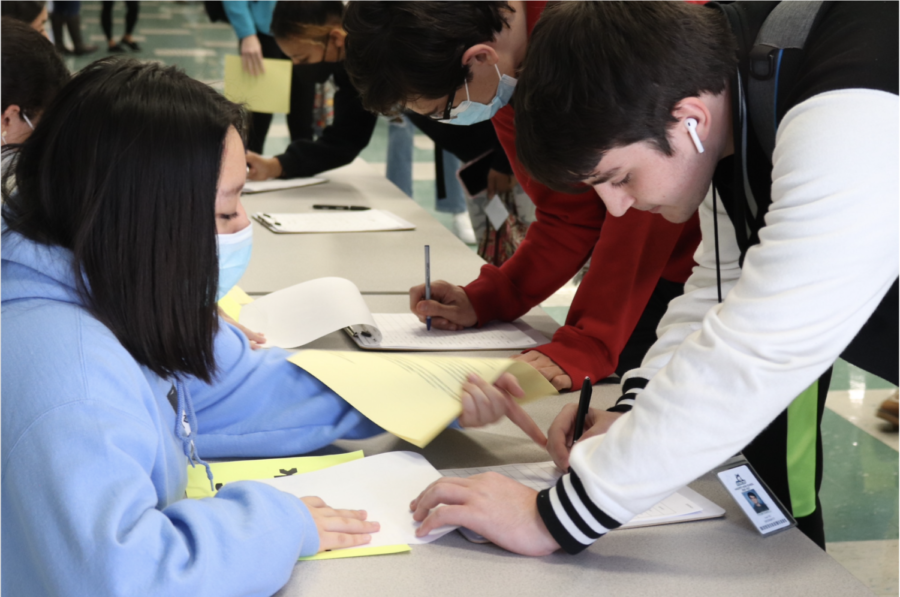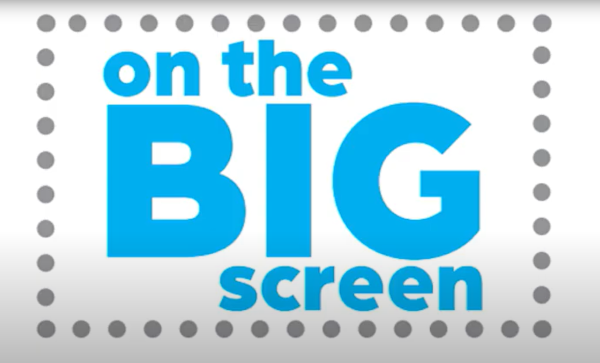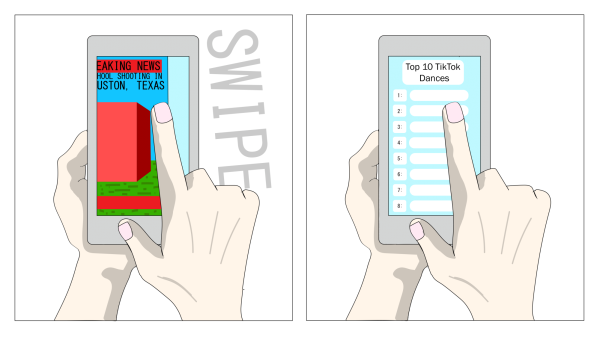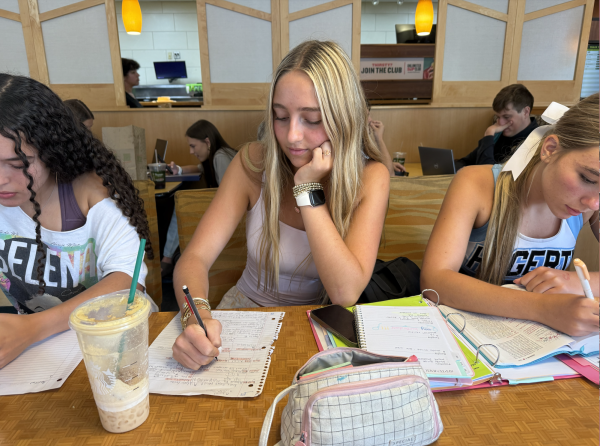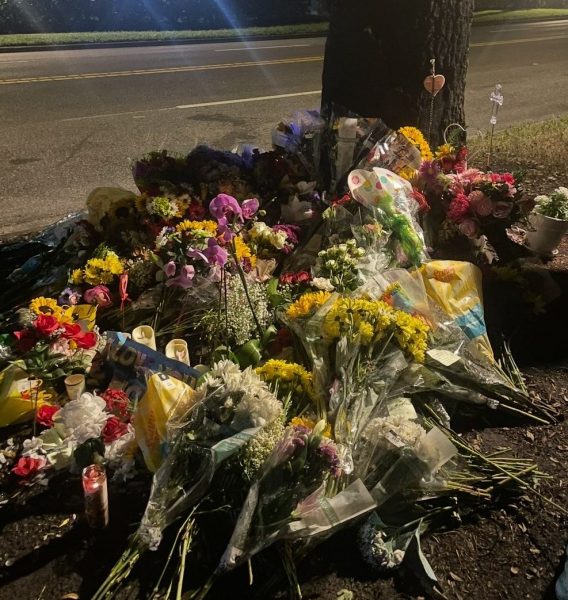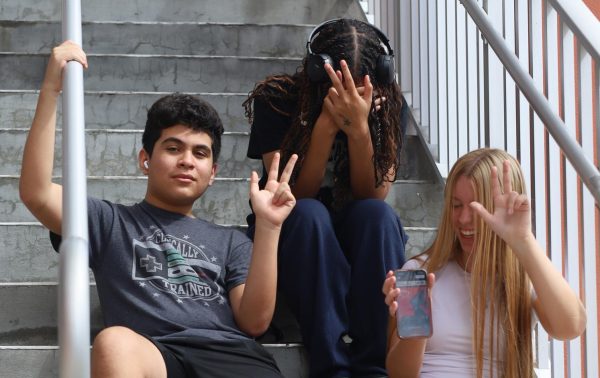A dishonorable process
Students find the application processes for honor societies to be confusing and misleading as information becomes more difficult to find
photo by Elise Nash
Junior Tyler Covelli signs up to apply for the National Honor Society. After receiving an invitation, students had to meet in the cafeteria to get their application, leading those not in attendance to miss out on information.
As the last bell rings, you run across campus, clutching on to your stack of papers. Sprinting through the halls, you are barely able to catch your teacher as she locks up her classroom for the day. Out of breath, you beg her to sign off on your honor society application, just to be told, “No, you should have come to me sooner.”
One of the most stressful parts of high school is building a competitive college resume. With added pressure from parents and teachers to beef up your schedule, extracurriculars and grades, a popular way of standing out on applications is through honor societies. By definition, honor societies are organizations used to highlight students of high academic achievement, but not all qualified students are given a fair chance to be recognized. A lack of information on requirements, applications and due dates causes many exemplary students to miss out on these societies and be deemed as “lazy” and “irresponsible,” when really, it can be impossible to find this vital information.
Honors societies often fail to make information and resources easily accessible, making it difficult for students to complete the application process, attend meetings and run for officer positions. While this would seem like simple information that should already be easy to find, it is not. Most students gain access to applications when they are invited to apply to an honor society. However, invitations are typically passed out on paper during class, so if a student is absent, it can be difficult for them to get a hold of their invitation. Students may also miss out on an invitation if they take a certain class online. For example, students receive information on language honor societies in their language class, which seems to make sense. However, many take language classes online through Seminole County Virtual School or Florida Virtual School, leaving them without any information on these specific societies and forcing them to seek it out for themselves.
This was the case with sophomore Alexis Butler, who had trouble applying to the National English Honor Society. While Butler met the academic qualifications to earn an invite, she never received one from her teacher. Rather, she heard about her other friends getting their invitations and realized she deserved one. While she was able to eventually gain access to the application from a friend, she was left with only one day to get recommendations and signatures from her teachers.
The counterargument seems obvious: “Seeking out information on honor societies shows your responsibility.” Yes, while some kids may care more than others about getting information on these groups, they still should not have to invite themselves into the honor society and beg for an application.
Even when students do try to seek out application information, the resources they find can be misleading. For example, while you can go to the Hagerty website to find application PDFs, these links are not all updated. Rather, some open PDFs to applications from previous school years. This can lead to the applications being reviewed as invalid since they have different requirements, instructions or free response questions.
Failing to give students their deserved invitations on time can lead to added stress and worry as their window to apply quickly runs dry. Teachers have the right to turn down a student when asked to sign a recommendation if they are asked on the day the application is due. While a student may work hard to seek out and get an application, their hopes of actually turning it in can be taken away by teachers, even though they were not given the same amount of time as other students.
Seeing your friends get invited to a society while you feel you also deserved to be invited can bring loads of disappointment to one’s academic ability. Students should not have to feel as if they don’t put in enough work or are not worthy of success due to a society not making information accessible. Anyone who has put in the work required for a society deserves to get an invitation, even if they were absent one day, take a class online or even have a teacher who did not care enough to give their students information.
Even if a student does receive an invitation, the process of applying can leave many confused and lost. Societies give little input on what makes an application seen as “great,” and most of their feedback includes phrases similar to “get more involved,” leading many applicants to feel as if they do not work hard enough or are not cut out for success.
Other students may not be accepted into a society solely due to a lack of a certain class credit. Junior Ava Manieri experienced this as she applied to join Rho Kappa, the social studies honor society, but was turned away because she did not have the 3.5 social studies credits required for admittance. While Manieri was aware of this requirement, she stated that there was confusion with which classes counted, making it more difficult to apply.
However, problems do not only exist in the application process. Many honor societies require volunteer hours from their members to show their acts of service, including the National Honor Society. Before Manieri was inducted into NHS, no information was given to her when it came to the amount of volunteer work needed, so when she found out she needed five individual and group volunteer hours per semester, she knew it would create conflict in her schedule, which was already filled with work and lacrosse practices. When students are not informed about these responsibilities prior to induction, they are unable to balance their workload and see what groups can fit into their tight schedules.
To help make information more accessible, honor societies could use social media to post updates on meeting times, service opportunities and application information. Their posts could include basic information on what attributes the group looks for when reviewing applications, along with links to the applications themselves. While some groups do use social media, their posts are focused on information for members, but they should also be catered towards incoming applicants. For students that don’t have social media, creating an eCampus page would be another great way to share information, which some groups already use. Even simply sending out an email to qualified students about what the society looks for with some tips and added information about applications would relieve many students’ anxieties.
We live in a world where academic achievement equals success, making honor societies even more important to students. But how are students supposed to achieve this success when they are not being told simple information? If honor societies want to attract the best and brightest students, they need to make the process of applying easier. Many qualified students may not even bother applying to a society because they “know they won’t get in,” which is not always the case. This negative self-talk can stem from students seeing their older peers be turned away from societies, even if they were missing important information about the application process. Honor societies should encourage students to be the best version of themselves – not make them question if they are good enough.
Your donation will support the student journalists of Hagerty High School. We are an ad-free publication, and your contribution helps us publish six issues of the BluePrint and cover our annual website hosting costs. Thank you so much!

